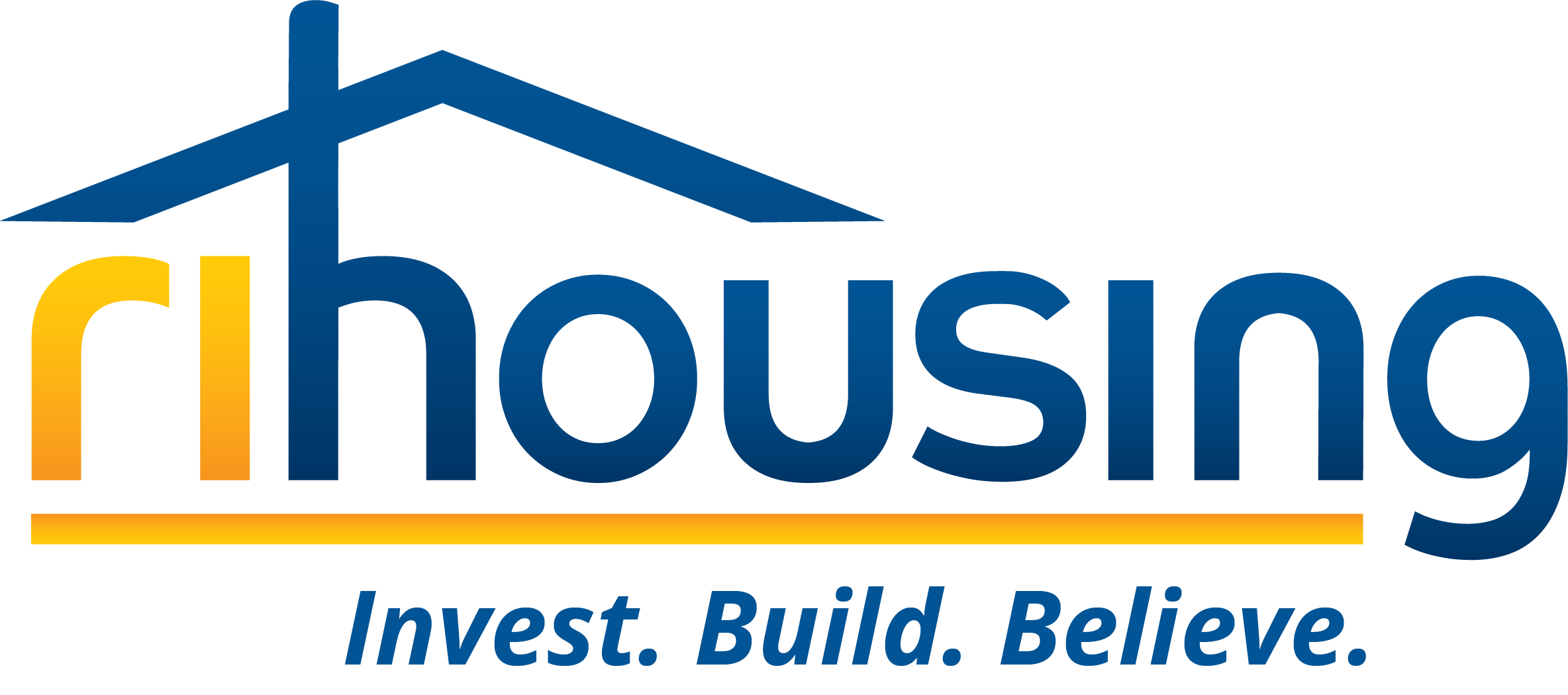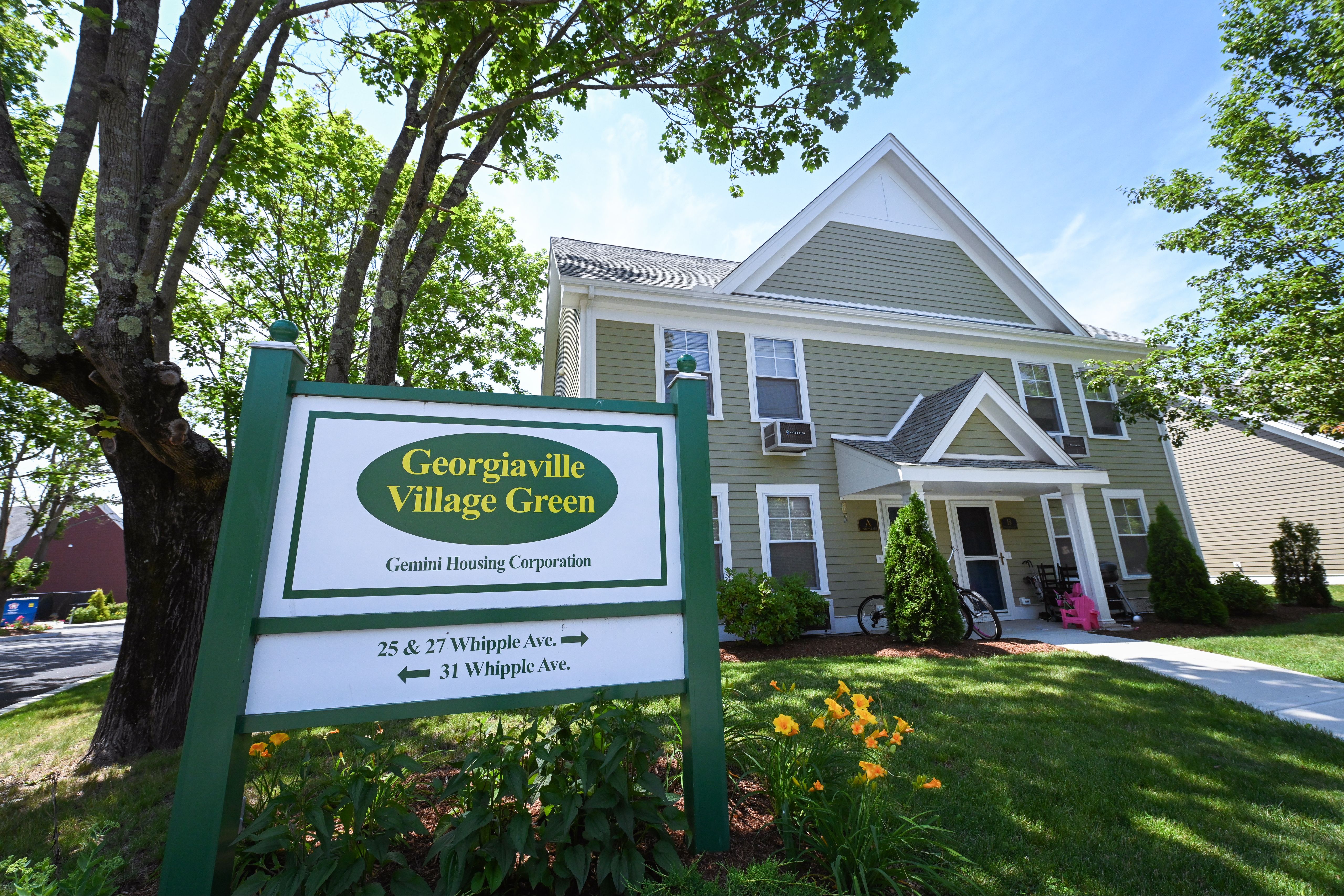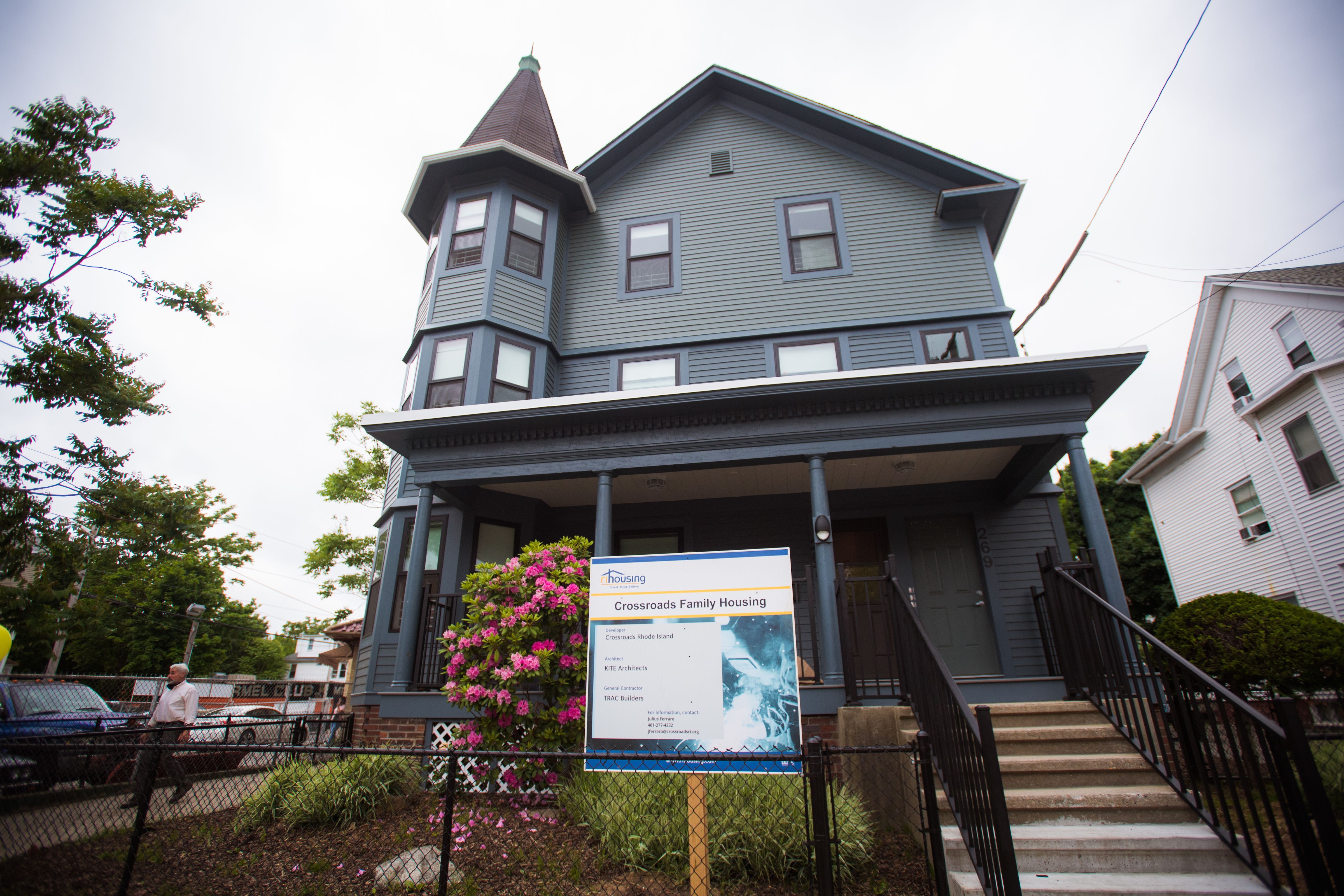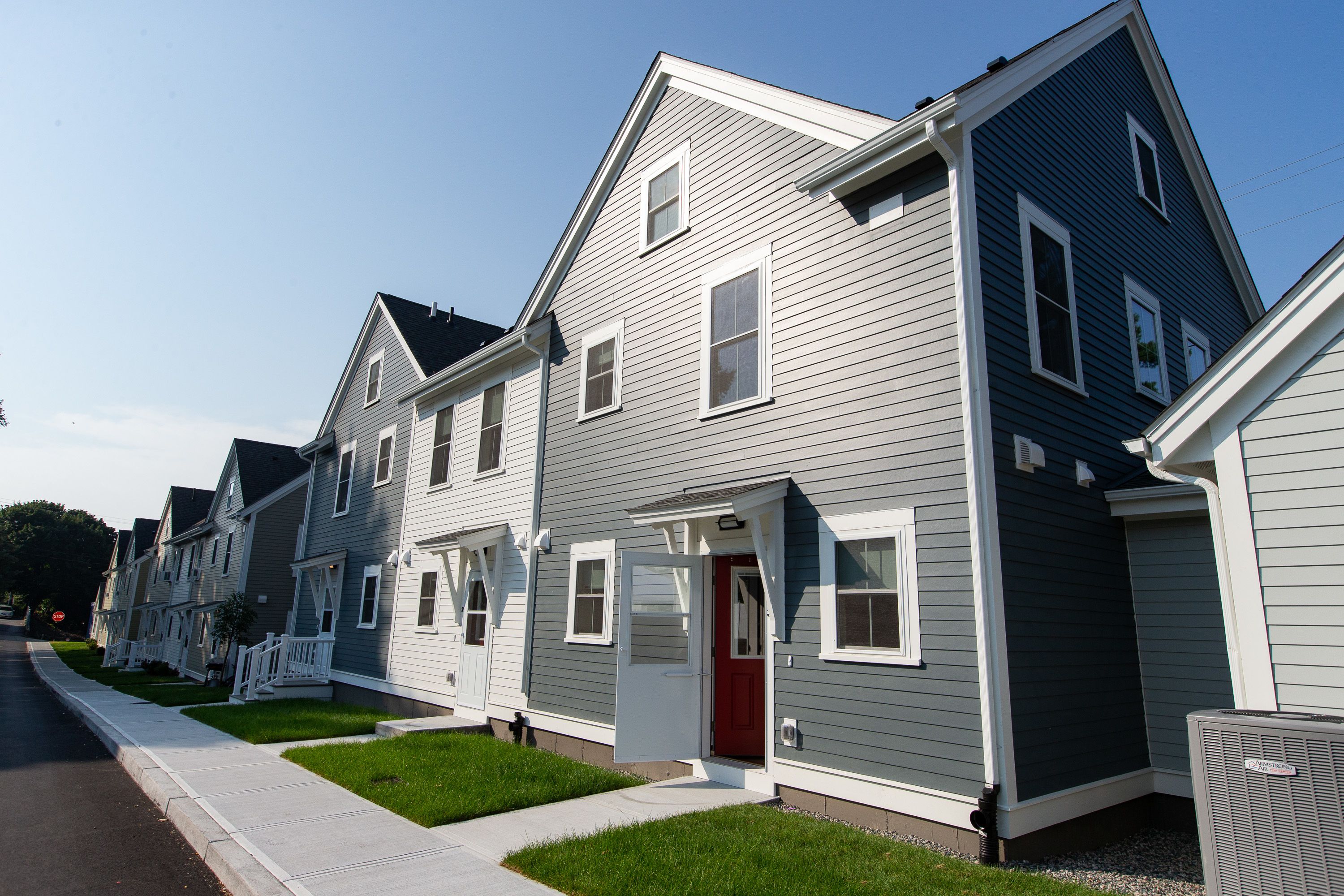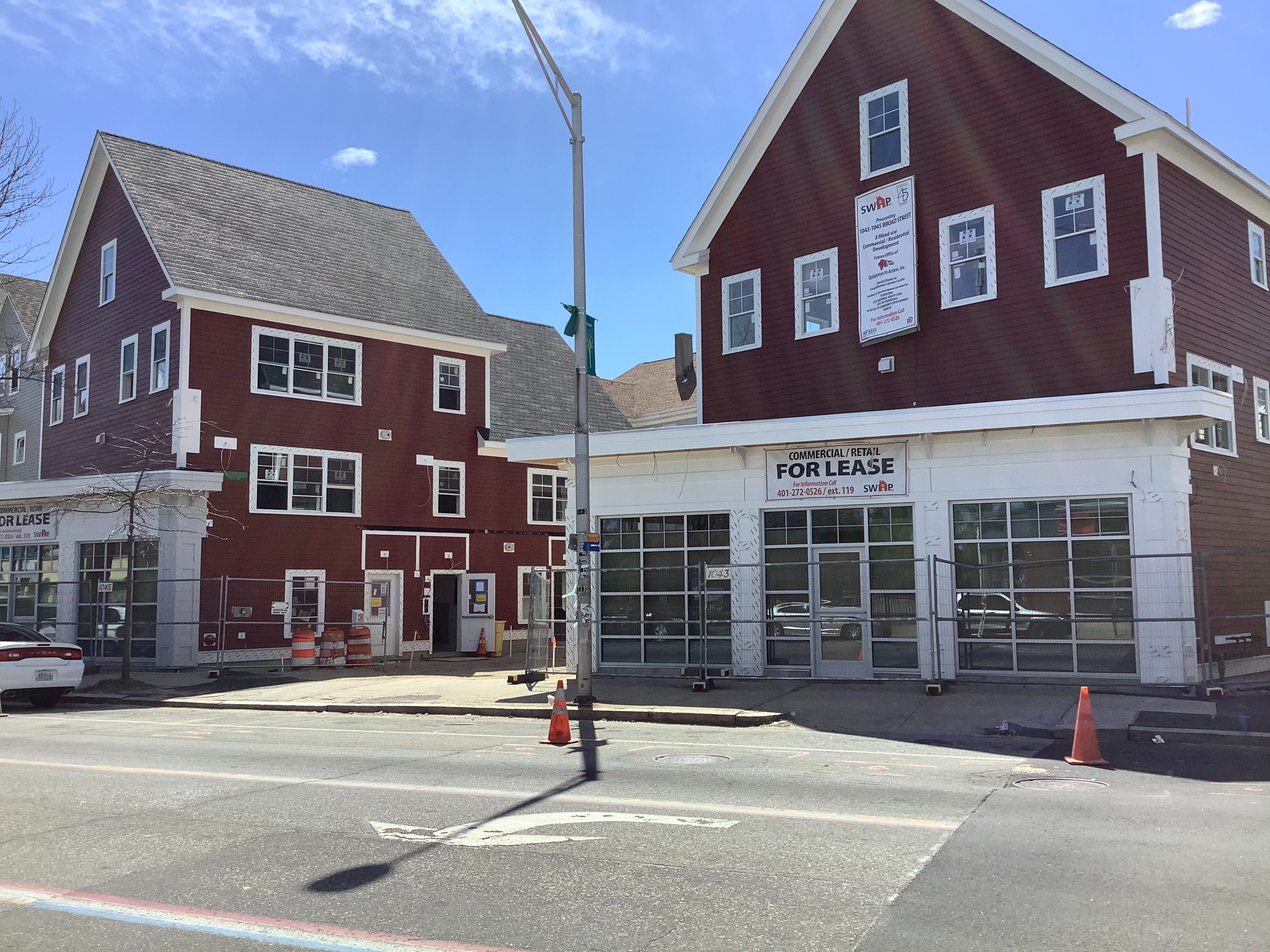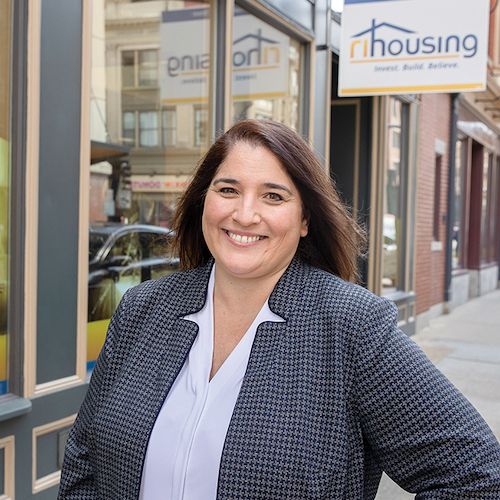Learn about RIHousing including our ESG Program, News & Press Releases, Projects, and Team.
Talk to us
Have questions? Reach out to us directly.
Learn about RIHousing including our ESG Program, News & Press Releases, Projects, and Team.
About RIHousing
- Established by RI General Assembly
- 1973
- Bonds and Notes Outstanding (as of 6/30/2024)
- $2.39 Billion
RIHousing is a self-supporting public agency created by the General Assembly in 1973 to provide financing to increase the supply of affordable housing for families with low or moderate incomes.
Pursuant to its enabling legislation, RIHousing is authorized to issue bonds and other obligations to fulfill its corporate purpose. In addition to its bond programs, the corporation administers the Section 8 Housing Assistance Program, the HOME Investments Partnership Program, the federal Low-Income Housing Tax Credit, as well as other state and federal programs.
The corporation supports its staff and operating expenses through bond fund earnings, federal grant administration fees and interest income. RIHousing does not receive state appropriations for its operating budget.
Image Gallery
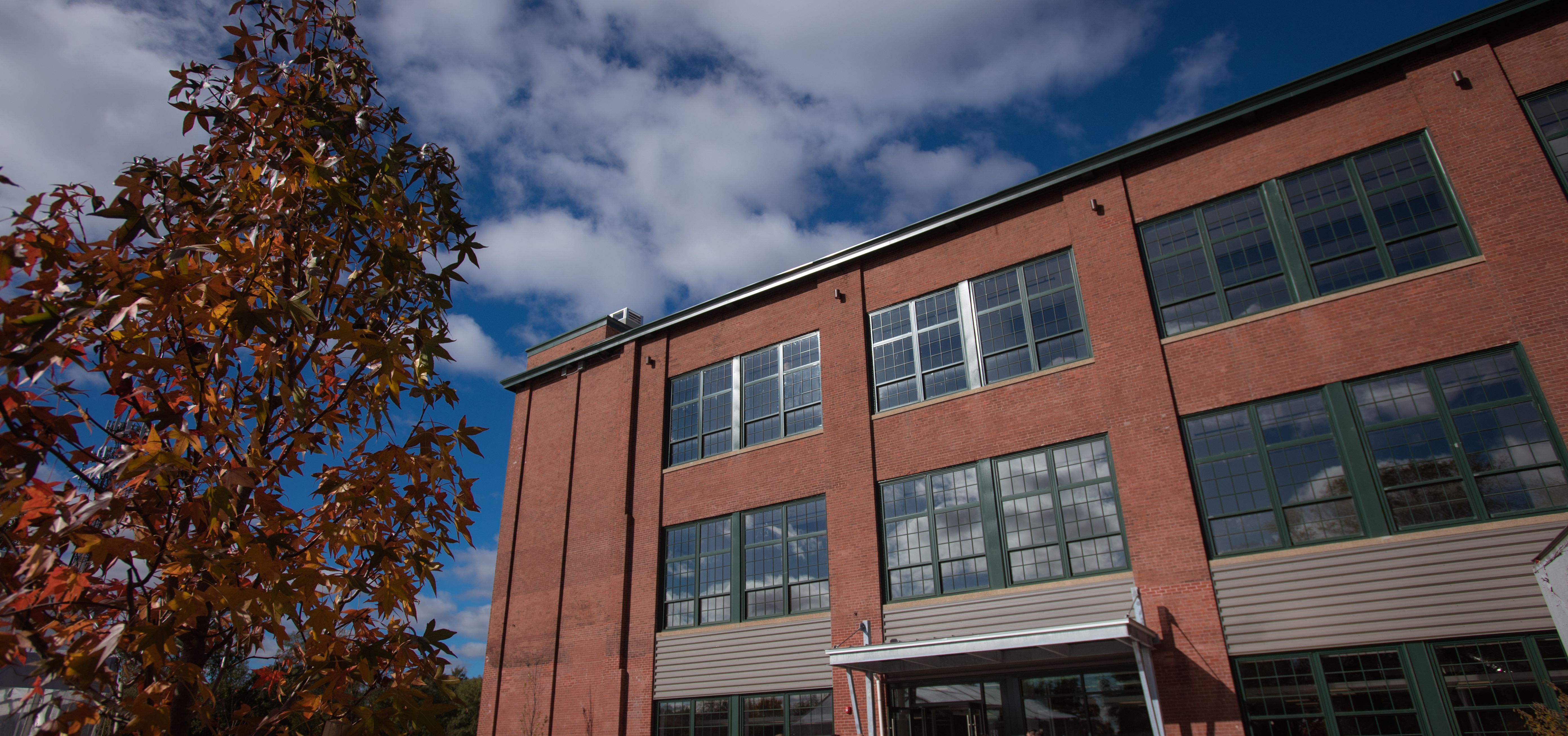
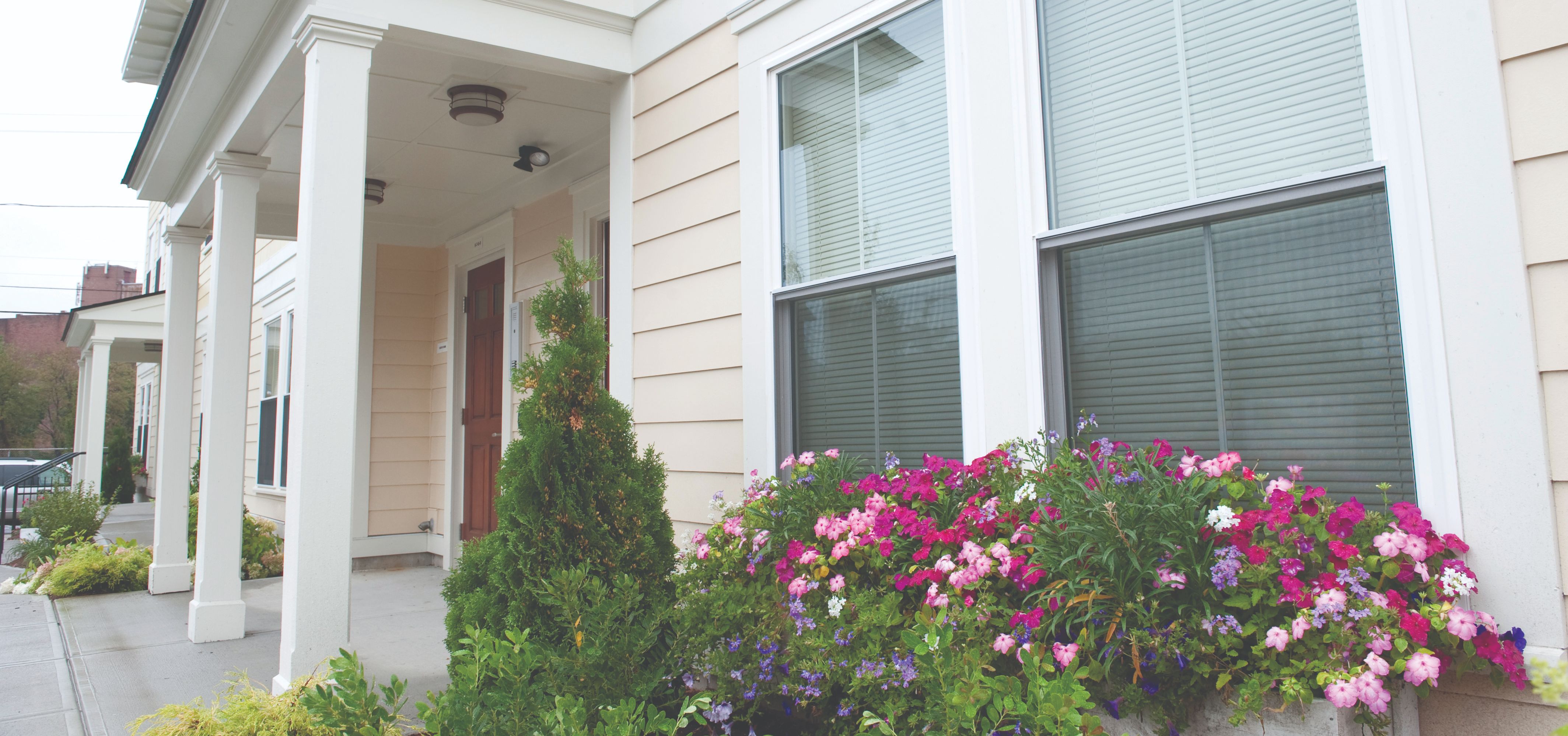
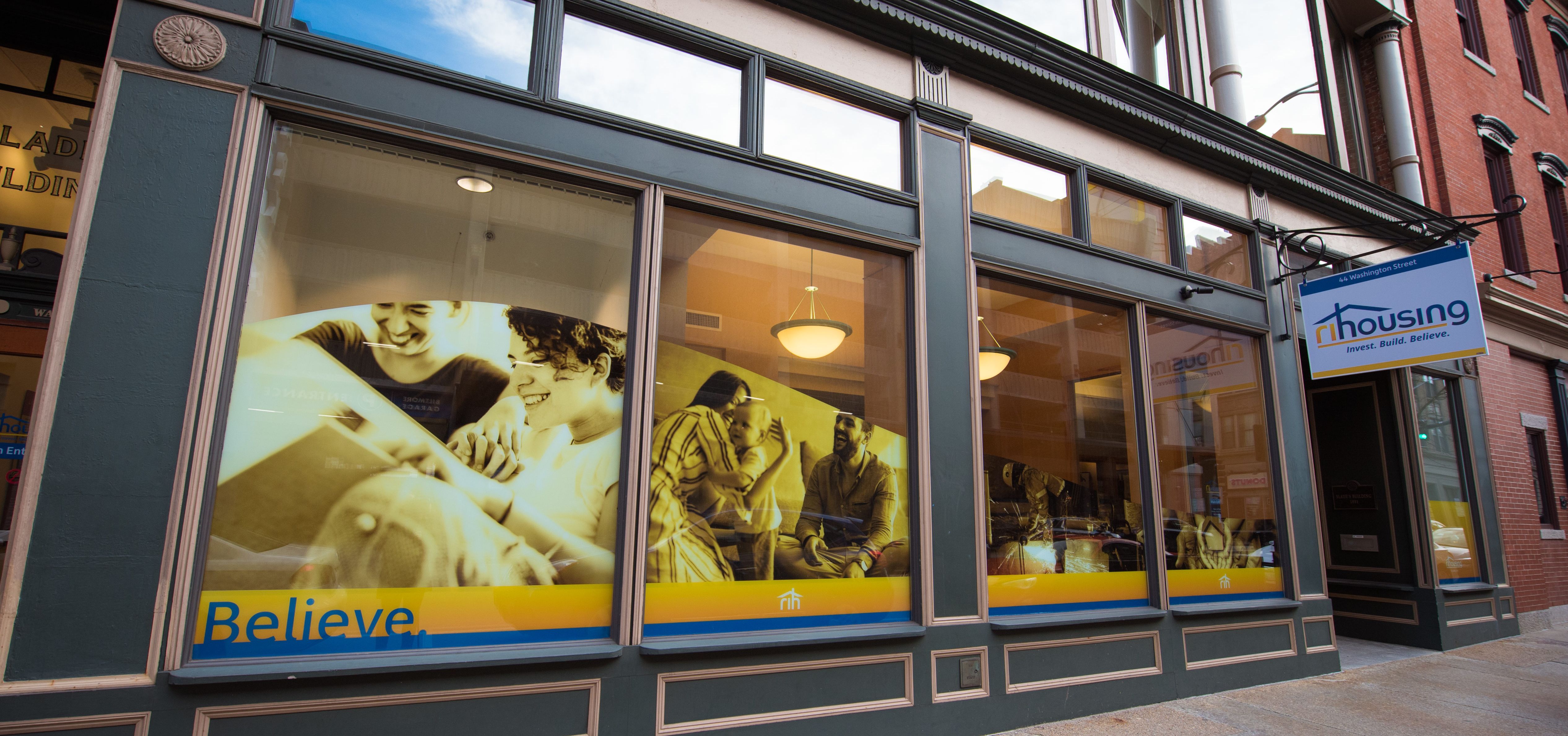
ESG Program
Learn about our environmental, social, and governance program, and how we bring those values to life with green bonds, sustainable projects, and more.
News
PROVIDENCE, RI – Governor McKee, the Executive Office of Housing (EOH) and RIHousing today announced the opening of a consolidated funding round focused on housing production. Building on previously announced funding programs from EOH and supported in part by the $120 million housing bond passed by voters in 2024, this Request for Proposals includes innovative new bond-backed initiatives plus staple programs to fund the acquisition, rehabilitation, and new construction of affordable housing.
“Production, production, production is the name of the game when it comes to tackling Rhode Island’s housing crisis,” said Governor Dan McKee. “Backed by a record-setting and voter-approved housing bond, we are bringing in innovative strategies to spur new housing opportunities that strengthen our workforce, bolster our economy, and help our families build prosperous futures.”
The programs provide financial assistance to a range of development stages and types, including for smaller scale projects that would not qualify for traditional Low Income Housing Tax Credit (LIHTC) financing. By leveraging these and other funding sources, developers will have ample support from the state to rehabilitate or build housing, adding to Rhode Island’s pipeline of new homes.
“The programs included in this consolidated round are designed to meet Rhode Islanders where they are — addressing the full spectrum of housing needs across our state,” said Secretary of Housing Deborah Goddard. “From new developments from small to large scale that expand our housing supply, to projects that preserve our existing affordable housing, each investment moves us closer to an improved housing landscape. Combined with $66 million in housing bond funds, the additional $47 million available today will accelerate the production and preservation of affordable homes, strengthen local partnerships, and ensure that Rhode Islanders at every income level have access to safe, quality, and affordable housing.”
“RIHousing is proud to release another consolidated funding round, which will provide over $113 million for housing activities in communities across our state,” said Carol Ventura, CEO & Executive Director of RIHousing. “With the inclusion of programs funded by the $120 million housing bond approved by voters last year alongside federal and state tax credits and programs like HOME, HTF, and HPF, this RFP offers developers a range of funding opportunities that will greatly contribute to housing production in Rhode Island.”
By combining these programs into one RFP, the process of applying for funding has not only been streamlined but simplified as well. RIHousing and the state worked together to adopt this consolidated process; interested parties can visit www.osa.rihousing.com to review and submit. Applications are due by 4 p.m. on December 18, 2025.
The programs included in this consolidated funding round are:
9% Low-Income Housing Tax Credit (LIHTC): Rhode Island’s annual allocation is approximately $3.5 million. Applicants are encouraged to review the 2026 Qualified Allocation Plan to ensure familiarity with program requirements, but Proposals must:
- Meet the required minimum set aside requirement of the Section 42 program.
- Create a minimum of 30 new units.
- For applications proposing preservation, 30% of the overall units in an application or 20 units, whichever is greater, must be newly created affordable homes.
- As the LIHTC is a highly competitive and scarce resource, no single development may be awarded more than 40% of Rhode Island’s annual small-state minimum allocation.
Tax Exempt Bonds and 4% LIHTC: RIHousing has traditionally accepted applications for bond financing on a rolling basis and will continue to do so. Completion of the consolidated application will be considered an application for tax exempt bonds. For proposals seeking tax exempt bonds and 4% LIHTC, applicants are encouraged to review the 2026 Qualified Allocation Plan to ensure familiarity with program requirements and priorities. Funding is available for rental housing only. RIHousing reserves the right to limit Tax Exempt allocations to determined financial feasibility of eligible bond basis and fund the balance of the construction loan with taxable debt.
Housing Production Fund (HPF): HPF is funded through state real estate transfer tax receipts. Approximately $1,500,000 in funding for production will be available under this RFP. While preservation of existing housing is an eligible use, new production is a priority. Developments must benefit low- and moderate-income individuals and families with gross annual incomes at or below 80% of Area Median Income (“AMI”) and there is a priority for households either exiting homelessness or earning no more than 30% of AMI. Mixed income developments are allowed under the HPF program. Funding is available for rental and homeownership opportunities.
HOME Investment Partnerships Program (HOME)*: RIHousing has approximately $3 million available in HOME funds. Awards will be capped at $1 million per project. HOME funds will be prioritized for successful 9% LIHTC applications.
Housing Trust Fund (HTF)*: The HTF program awards funding for the acquisition, rehabilitation, and new construction of rental housing for extremely low-income individuals and families. HTF funds will be prioritized first for successful 100% Permanent Supportive Housing Projects with less than 30 units using the Permanent Supportive Housing Program fund scoring criteria for applications requesting HTF, and second, if funding remains, for LIHTC applications that contain Permanent Supportive Housing units. Approximately $3 million is available.
*****Note – all HOME and HTF funded projects will be subject to the Build America Buy America (“BABA”) requirements as outlined in the Infrastructure Investment and Jobs Act signed into law on November 15, 2021.
Housing 2030 Permanent Supportive Housing Program: Housing 2030 PSH provides funding for the development of 100% new permanent supportive housing (“PSH”) multifamily projects for households with incomes at or below 30% of AMI. Further, this initiative will prioritize funding small scale developments which are too small for traditional low-income housing financing tools such as LIHTC. Up to $12 million is available.
Housing 2030 Small Scale Rental Program: Up to $12 million is available for new construction of income eligible rental units for households earning up to 120% AMI. Developments must be no fewer than 5 and no more than 30 units. At least 51% of units in any funded developments must be affordable units that are secured with a deed restriction of at least 30 years.
Housing 2030 Affordable Rental Housing New Development Program: Up to $27 million is available for new construction, rehabilitation, and/or adaptive reuse of income eligible rental units. All applications must include 51% or more new construction units. Developments must benefit low- and moderate-income individuals and families earning up to 120% of the AMI.
Housing 2030 Preservation Program: The source for Housing 2030 Preservation is $5 million in housing bond funds through the Rhode Island Executive Office of Housing and $5 million in RIHousing Affordable Housing Trust Fund funding. Up to $10 million is available for preservation of income eligible rental units for households earning up to 120% of the AMI.
Housing 2030 Acquisition and Revitalization Program: $10 million is available for strategically targeting foreclosed and/or blighted residential and commercial properties and vacant lots in need of redevelopment. Income of households assisted under the program is limited to 120% of the AMI. Eligible properties include residential, commercial and vacant lots located in Rhode Island that are determined to be blighted or are foreclosed and are part of a municipal revitalization plan or strategy.
State Low-Income Housing Tax Credit (State LIHTC): The purpose of the State LIHTC is to provide gap funding for the development of affordable housing in Rhode Island. Up to $30 million is available. Only projects with federal LIHTC awards (4% and /or 9%) are eligible to receive State LIHTC, which will be awarded prior to construction closing; the amount of credits will be sized to fill remaining gaps in the project funding. The developer will receive the tax credits over five (5) years after the project is placed in service. The developer is also eligible to redeem the tax credits for 90 cents for each dollar of tax credits awarded. This cash redemption would also occur over five (5) years after the project is placed in service.
Zero Energy for the Ocean State (ZEOS): RIHousing has partnered with the Rhode Island Office of Energy Resources and Rhode Island Energy to provide funding to support the creation of energy efficient Zero Energy Building “ZEB” housing units in Rhode Island for low- and moderate-income residents earning up to 120% of the AMI. Project proposals must include heat pump technologies and onsite (or if available, community) solar in pursuit of ZEB status. Up to $1,558,000 of grant funding is available for new construction or rehabilitation of income eligible units.
PROVIDENCE, RI – Congressman Seth Magaziner, Providence Mayor Brett Smiley, and Housing Secretary Deborah Goddard joined the Preservation of Affordable Housing, Inc. (POAH) and RIHousing today to celebrate the start of rehabilitation work on Pocasset Manor in the Olneyville neighborhood of Providence. Built in 1982 as affordable senior and disabled housing, POAH purchased the property in 2006 to ensure that tenants would not be priced out of their homes.
Pocasset Manor is an 11-story, 82-unit development for seniors earning up to 60% of the Area Median Income, which for one person is up to $48,060. The purchase of Pocasset by POAH also included nearby Hillcrest Village, with units reserved for seniors, and Hillside Village, which has affordable housing for families. Pocasset was last renovated in 2007. Updates on this round of necessary rehabilitation will include upgrades to kitchens, baths, and finishes, a new roof, full-building WiFi, new washers and dryers, and elevator modernization.
Funding for changes to Pocasset include over $500,000 from the U.S. Department of Housing and Urban Development’s (HUD) Green and Resilient Retrofit Program (GRRP), which was inspired by Senator Jack Reed’s Green Retrofits Act. GRRP awarded funds specifically to existing affordable housing developments to implement or update energy efficient and climate resilience measures. Pocasset Manor is using their GRRP funds on a variety of green and energy efficiency upgrades that will bring the building up to current design and accessibility standards and improve quality of life for residents.
“This project is good news for the residents of Pocasset Manor and taxpayers alike. Through the Green and Resilient Retrofit Program that I helped create and other federal housing programs that I support, POAH is utilizing federal investments to preserve critical affordable housing here in Providence while smartly reducing our carbon footprint, lowering energy costs, and building on community assets at the property,” said Senator Jack Reed, who helped support over $12 million in federal funding for the upgrades. “This rehabilitation project will help to ensure Pocasset Manor can continue to offer safe, healthy, affordable homes for older Rhode Islanders and people with disabilities for decades to come.”
“Every Rhode Islander deserves a safe and affordable place to call home,” said Representative Seth Magaziner. “The rehabilitation of Pocasset Manor is a major step toward ensuring that seniors and people with disabilities can continue to live safely and with dignity. This project shows what’s possible when local, state, and federal partners work together to invest in housing.”
RIHousing’s 2024 Low- and Moderate-Income Housing chart shows that Providence had the largest addition of newly deed-restricted units across the state last year; with the kickoff of renovation for Pocasset Manor and similar projects in the pipeline, the city is navigating the balance of building new affordable homes while preserving the ones that already exist.
“Investing in safe, affordable and sustainable housing for our seniors is a priority in Providence,” said Providence Mayor Brett P. Smiley. “The improvements at Pocasset Manor ensure that our older residents can age with dignity in modern, energy-efficient homes and reflect our broader commitment to environmental responsibility and community wellbeing. I’m grateful to POAH, RIHousing and our federal partners for their leadership in advancing housing that is both affordable and resilient.”
“We are excited to begin the renovations of Pocasset Manor and we are grateful to all of our funders, especially RIHousing, for the substantial investments they are making for our residents,” said Aaron Gornstein, President and CEO of Preservation of Affordable Housing (POAH). “We look forward to working together in the very near future to renovate additional POAH properties in Providence.”
In addition to GRRP, Pocasset Manor has secured renovation support from several sources, including an RIHousing First Mortgage and federal Low-Income Housing Tax Credits—a program administered by RIHousing that plays a vital role in both developing and preserving affordable homes across Rhode Island. As part of this transaction, the development has been placed under a new deed restriction, extending Pocasset’s affordability for another 30 years and ensuring a stable, long-term housing option for current and future tenants.
“As we work to build new affordable homes across our state, we must also protect the ones we already have,” said Secretary of Housing Deborah Goddard. “Preservation is the twin of production—we can’t meet our housing goals without both. Housing 2030 sets bold but achievable targets and reaching them requires the right balance between creating new units and preserving existing ones. I’m grateful to POAH for their commitment to this work and look forward to seeing preservation efforts continue across Rhode Island.”
“As we focus on the expansion of affordable housing in Rhode Island, we must continue to maintain and preserve the affordable homes we already have,” said Carol Ventura, CEO & Executive Director of RIHousing. “RIHousing is proud to offer funding support to assist in upgrades to existing affordable housing developments, bringing them to current standards and providing residents with modern, updated infrastructure and living spaces.”
Preservation of Affordable Housing, Inc., headquartered in Boston, MA, operates in 13 states and Washington, D.C., with 11 properties in Rhode Island.
MANVILLE, RI – Connolly and Partners, LLC, and RIHousing were joined by Senators Jack Reed and Sheldon Whitehouse, Congressman Gabe Amo, Governor Dan McKee, local officials and funding partners to mark the groundbreaking for The Village at Manville. The 72-unit building cluster will be located beside St. James’ Church, the original seller of the land.
“Strong, healthy, thriving communities need an adequate supply of housing options for everyone. I am pleased to deliver federal financing for this project, which will transform a vacant site into 72 new, affordable units in Lincoln. The Village at Manville is a testament to the private-public partnerships necessary to ensure people of all income levels can live, work, and put down roots here. It will be a great addition to a wonderful neighborhood,” said U.S. Senator Jack Reed, a member of the Appropriations Committee who created the national Housing Trust Fund (HTF), which contributed $1,174,331 to the project.
“Rhode Islanders are among the hardest hit by the nationwide affordable housing supply crunch,” said U.S. Senator Sheldon Whitehouse. “Our American Rescue Plan, together with federal Low-Income Housing Tax Credits and other federal investments, has been put to work providing 72 families a stable, affordable place to call home and helping ease cost pressures in the market.”
“Building more affordable housing is key to providing economic security for all Rhode Islanders,” said Congressman Gabe Amo. “Thanks to RIHousing’s dedicated work and public-private partnerships across all levels of government, I celebrate the groundbreaking for these 72 new units of affordable housing that residents in Lincoln will soon be able to call home.”
“My Administration is committed to increasing housing options in every community across our state—and that means investing in developments like The Village at Manville,” said Governor Dan McKee. “From launching the state’s first-ever Low-Income Housing Tax Credit to passing a historic $120 million housing bond and creating our Housing 2030 plan, we’re putting families and their futures first. The homes at The Village at Manville are a strong example of the progress we’re making.”
Comprised of three residential buildings and one community center, all 72 units will be affordable for individuals and families earning up to 80% of the Area Median Income (AMI). Eight of these units will be set aside for households earning up to 30% of the AMI – for a family of three that’s $30,900. These units will be supported by Section 811 vouchers through the U.S. Department of Housing and Urban Development’s (HUD) Supportive Housing for Persons with Disabilities Program, which ensures housing affordability, support, independence, and accessibility for program participants. RIHousing administers the program on behalf of HUD. Voucher holders pay 30% of their income to rent and utilities and receive supportive services from Department of Behavioral Healthcare, Developmental Disabilities & Hospitals-approved providers.
The Village at Manville joins an increasing number of affordable housing developments in Lincoln – like Lincoln Lofts, which opened in 2020 with 45 units. Including The Village, 130 new units of housing are currently in the pipeline for the town; they are supported by State Fiscal Recovery Funds (SFRF), among other funding sources. Together, these development activities are contributing to a significant increase in housing stock – the majority of them affordable — in an attractive, sought-after community, at a time when Rhode Islanders face a difficult housing market.
“We’re making real, substantive progress on addressing Rhode Island’s housing crisis. I am very pleased that towns like Lincoln are embracing the need for more affordable housing,” said House Speaker K. Joseph Shekarchi (D-23, Warwick). “Families who meet the threshold for ‘affordable housing’ are working families – teaching assistants, health care aides, public safety professionals, and more. They are the backbone of our communities and deserve to live in the area they serve.”
“Rhode Island’s housing crisis impacts people in every corner of our state, and it threatens the health and economic well-being of every community,” said State Senator Jake Bissailon, D1 – Providence. “The Villages at Manville will provide critically needed units in the Manville neighborhood and help ease the lack of access and affordability in the area. Additionally, its mixed-income approach and inclusion of various amenities makes it an example of the kind of development we need throughout our state. As Chairman of the Senate Committee on Housing & Municipal Government, and on behalf of President Lawson and my colleagues, I commend the many partners who made this project possible.”
“The Village of Manville project represents a significant investment in the future of our community, providing 72 much-needed units of affordable housing for families and individuals who want to call Lincoln home,” said Lincoln Town Administrator Philip Gould. “This development reflects our continued commitment to housing opportunities for all. I want to thank Rhode Island Housing, Connolly and Partners, and Governor Dan McKee for their leadership and support. I also deeply appreciate the efforts of Senators Jack Reed and Sheldon Whitehouse, as well as Congressman Gabe Amo, for their strong advocacy and continued investment in communities like ours. This is a proud moment for Lincoln and a meaningful step forward for Manville.”
Financing for The Village at Manville comes from multiple sources, including SFRF and the federal Low-Income Housing Tax Credits (LIHTC), both administered by RIHousing. The Governor and General Assembly’s historic investment of over $322 million of SFRF into housing and homeless programs has been critical in the effort to increase affordable housing across the state, creating new rental and homeownership opportunities. The federal LIHTC has been another important resource in the development of affordable homes, offering tax incentives to developers and investors and providing an additional funding stream to encourage companies to invest in affordable housing in Rhode Island. Additional construction financing was also provided by Bank of America Rhode Island as well as the Town of Lincoln.
“Connolly and Partners, a First Hartford company, would like to thank RIHousing and Bank of America for their efforts in the successful financial closing of the Village at Manville,” said John Toic, President of First Hartford Realty Corporation. “This is a significant investment in Rhode Island that will benefit the surrounding communities, residents, and environment. Furthermore, this allows Connolly and Partners to continue our ongoing commitment to the development and preservation of affordable, high-quality, safe, and accessible housing.”
“The Villages at Manville exemplifies the goals of Housing 2030—delivering affordable housing options across the income spectrum through innovative public-private partnerships, the strategic use of federal resources, and the repurposing of underutilized land to meet urgent housing needs,” said Rhode Island Secretary of Housing Deborah Goddard. “Housing is where it all begins, and if we don’t get housing right, we won’t get the rest right—but we’re getting housing right.”
“Bank of America Community Development Banking is pleased to provide a construction loan and tax credit investment to help finance much-needed affordable for families in Manville,” said Bank of America Rhode Island President Kevin Tracy. “The Village at Manville is a great example of the impact we can make through public-private partnerships to support the communities where we work and live.”
“RIHousing is proud to be a supporter of The Village at Manville, a development that will bring more affordable housing options to Lincoln,” said Carol Ventura, CEO & Executive Director of RIHousing. “We were happy to provide essential funding for this project and remain firmly committed to investing in affordable housing opportunities across Rhode Island.”
The Village at Manville is the first development in Rhode Island for Connolly and Partners, a subsidiary of First Hartford Realty Corporation. Their other communities are in Massachusetts, Connecticut, New York and Delaware.
Projects
Team
Talk to us
Have questions? Reach out to us directly.
